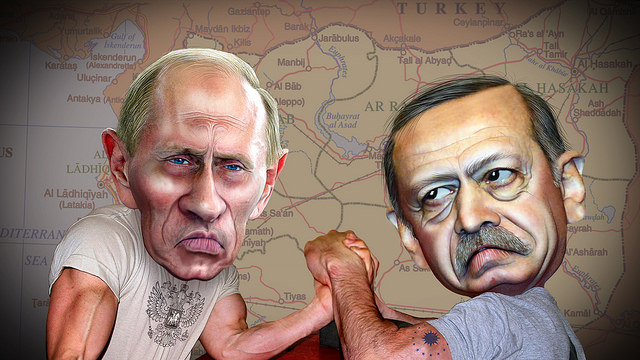Turkey and Russia Trade Blows, With Troubling Results
December 9, 2015
On the 24th of November, a Russian attack aircraft was shot down by Turkish fighters as it entered the Turkey-Syria border region. Since then, tensions between Russia and Turkey have continued to rise as blame is shifted back and forth, which is especially problematic. Considering Turkey’s status as a member of NATO, Turkey would have support in the event of a war, which in theory could even escalate to the use of nuclear weapons.
Turkish officials state that on that day, two unidentified aircraft were spotted approaching Turkish airspace. Halit Cevik, Turkey’s representative on the UN Security Council, stated that the approaching aircraft were warned 10 times over the span of five minutes to change their course. After they had disregarded the warnings, they proceeded to fly a little over a mile into Turkey. One of the planes left Turkish airspace, while the other was fired upon by Turkish aircraft, acting within what Turkey deemed to be within NATO rules of engagement. The Russian fighter crashed, killing the pilot. The navigator survived, and stated that he did not receive a warning before being fired upon.
However, President Putin, provides a different story altogether, stating that the Russian fighters were over Syrian territory, and took a completely different flight path. Russia’s defense ministry insisted that the aircraft did not cross into Turkey, and received no warning prior to being fired upon. President Putin was quick to implicate US involvement, stating that the US military knew of the flight plans.
Russia immediately moved anti-aircraft missiles to a Syrian airbase in a show of force, with an engagement range that covers the airspace above Syria, Lebanon, Cyprus, half of Israel, and a sizable portion of Turkey. President Putin has also moved to ban anything remotely related to Turkey, banning imports and work of Turkish companies situated in Russia. President Putin claimed that Turkey shot down the fighters in order to protect oil trade between Turkey and ISIS. Turkey, however, denied all claims.
NATO, however, has so far supported Turkey’s actions. After a gathering of the primary decision-making council, representatives made clear that they stand behind Turkey’s right of territorial defense.
Russia is a major ally of President al-Assad of Syria, while Turkey is known to be against al-Assad’s rule. Rebel forces, such as ISIS, have also been carrying out strikes against Syria. Russia places blame on Turkey, claiming that shooting down their fighters would lessen the airstrikes carried out on ISIS, leaving Syria with less defense.
NATO’s backing of Turkey is concerning; if Russia or Turkey engage in combat, the conflict may escalate to the engagement of nuclear powers. With the possible match-up of the US and Russia, the situation must be handled carefully, lest countries are plunged into another worldwide conflict.
Creative Commons photo source: https://www.flickr.com/photos/donkeyhotey/22749581653/





